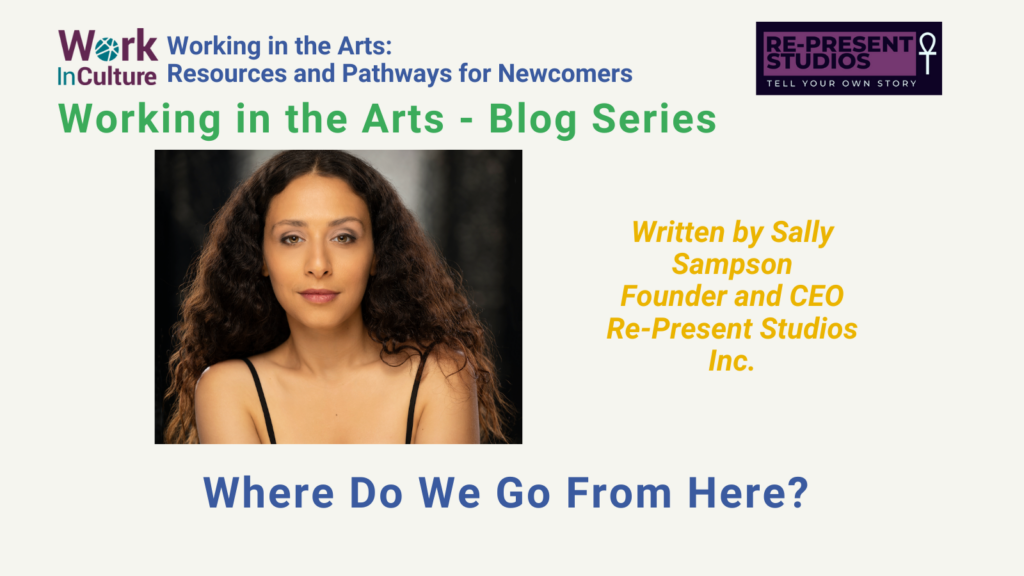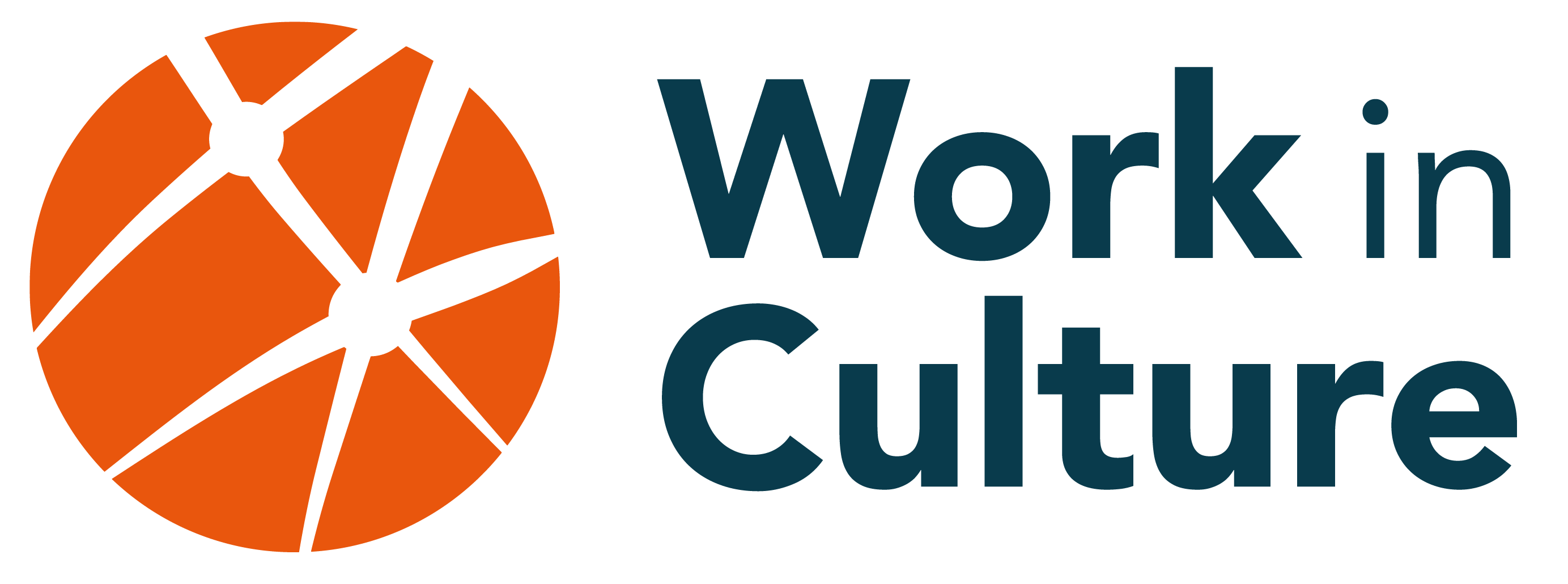
A Working in the Arts blog series by Sally Sampson
This blog is part of the Working in the Arts blog series. Working in the Arts is a new program from Work in Culture that aims to help streamline the pathway to careers in the arts for newcomer and immigrant artists and arts professionals. Working in the Arts was developed in partnership with Airsa, the Immigrant Writers Association, the Institute for Creative Exchange, Paralia Newcomer Arts Network and the Toronto Region Immigrant Employment Council, and made possible with support from the Canada Council for the Arts.
Who is Sally Sampson?
Sally Sampson is the Founder and CEO of Re-Present Studios, a company that trains and empowers performers from predominantly underrepresented and marginalized groups to reclaim their identities and tell their own stories.
Having lived in various parts of the world from Bahrain to Oman to the UK, Sally’s multicultural experiences have deeply influenced her perspectives. Her diverse background not only enriches her work as an artist, but also drives her vision for Re-Present Studios. Determined to be a catalyst for change, Sally is committed to ensuring every artist has a platform to share their authentic voice and she’s eager to foster collaboration and bridge cultural gaps in the Canadian arts scene and beyond.
Where Do We Go From Here?
by Sally Sampson
Just To Be Clear…
Being a newcomer is hard. Not just a little hard or kind of hard — it’s the kind of hard that makes you look at yourself in the mirror every morning and question your sanity and life decisions.
As a newcomer, you don’t just navigate a brand-new location, culture, climate and even language sometimes, but you’re also constantly grappling with a mixed bag of emotions from excitement to fear to homesickness that can all simultaneously hit you as you do something as ordinary as wait for the bus or shop at a grocery store.
Leaving behind a familiar place and the network of people that comprised your support system and setting out in search of a better life for yourself is undoubtedly a bold and exhilarating experience that causes exponential growth in an incredibly short timeframe. However, we must never forget to acknowledge the reality of just how gut-wrenchingly difficult, lonely and terrifying it can also be. It’s like playing a game without fully understanding the rules — and I don’t mean Connect Three; I mean the Hunger Games!
I have been a professional performer for almost 15 years now, and, even though I am a Canadian citizen, I only just moved back to Canada at the end of 2021 to start building a life here and to be physically closer to the industry that I aspire to work in sustainably and consistently for as long as I possibly can. Just for context, the last time I lived here was in 1996 as an 8 year old, so things have slightly changed in the interim and, as I write this, I too am discovering what it’s like to live in this country as an adult.
Now I fully acknowledge that being a Canadian citizen comes with a set of privileges that is not necessarily afforded to immigrants or other newcomers (particularly visible minorities) who are trying to build a life in this country. Nevertheless, as the daughter of immigrants, I can still deeply relate to the struggle of immigrants and what it means to start from scratch, navigating the arts scene in Canada with no real prior knowledge, experience or network to fall back on.
I have also had to start from scratch and, like you, I am right in the messy middle of my Rocky cutscene — and it is not glamorous. So, before you read another word, I just want to say that you’re not alone! As entrepreneur and writer Alex Hormozi says, “This is what hard feels like,” so don’t believe the lie that just because pressure is present and overwhelm is never-ending, that you are not cut out for this. It feels hard, because it is hard, so let’s call a spade a spade and keep moving forward.
Strategic Shifts
As the famous quote goes, “Insanity is doing the same thing over and over again and expecting different results.” And yet, we are all guilty of this as artists. Without realizing it, we find ourselves stuck on a fast-spinning hamster wheel, conditioned to believe that the pearly Oscar-adorned gates of showbiz only open when decision-makers and gatekeepers miraculously notice us and grant us access.
It has taken me years of doing the same thing over and over, to realize that I had become very good at changing my external circumstances (location, workplaces, social circles) without actually changing the strategy I was using to progress my career as an artist. I was so stuck in scarcity, feeling like an imposter and waiting for someone to “give me a shot” that I never stopped to actually take stock of all of my skills.
Until I hit a breaking point!
Earlier this year, there was a point where I was working three jobs, all the while auditioning whenever the opportunity arose. I was working incredibly hard — completely driven and focused — when everything started to fall apart at the seams. Just like that, I started to lose one job after the other, for a multitude of reasons ranging from financial difficulties to corporate restructuring, and after so many years of hustling my behind off, I felt like a total failure!
I had moved to Canada, leaving behind a successful decade-long career on the radio in Egypt, to chase my artistic dreams and, in the blink of an eye, things had gone downhill faster than I could absorb what was happening. Obsessively trying to figure things out, I asked myself what anyone would ask themselves in a tough situation: “What do I do now?”
I didn’t realize it then, but asking myself that question was fanning a spark in my brain that had been waiting to turn into a bright and burning flame.
As the fighter/hustler in me began to fight back, I found myself asking myself better and more strategic questions.
“What can I do?”
“What am I highly skilled at?”
“What am I highly skilled at that is in demand?”
“What am I highly skilled at that is in demand that is monetizable?”
“What am I highly skilled at that is in demand that is monetizable and high leverage?”
“What am I highly skilled at that is in demand that is monetizable, high leverage and that will get me to my goals?”
Somewhere between the Tony Robbins quote, “The quality of your life is determined by the quality of the questions you ask yourself,” and the song Defying Gravity from the musical Wicked, “Something has changed within me. Something is not the same. I’m through with playing by the rules of someone else’s game,” — I knew that something major and critical had shifted inside of me.
I was determined to not get back on that hamster wheel again.
The Ecosystem of Progress
It is indisputable, in my opinion, that artists and performers, who dig their heels in and stick with the turbulence of the industry no matter what, are hustlers! And those that have traditionally been overlooked, undervalued and underpaid for being a part of an underrepresented or marginalized group are super-hustlers. This, without a doubt, equips them with an incredible array of skills over time and it makes them exceptionally resourceful, far beyond what the average person can imagine.
In other words: they have all the pieces of the puzzle, but they’re just not sure how to piece them all together.
Being a super-hustler myself, I began to develop a model on my whiteboard at home, called “The Ecosystem of Progress.” It is an entrepreneurial concept crafted to make performers and artists start acting like empowered businesses in the economy, instead of helpless, standalone, waiting-for-work hires. In the midst of my own personal battles, this is my attempt at putting the puzzle together for me and for everyone else that has shared and shares my struggles in the industry.
Here is a brief breakdown of “The Ecosystem of Progress”:
- Start With Your Skills: Identify the skills you’ve developed and stacked over time. Find out which ones are in demand and think about what skills work together. This isn’t necessarily just about one skill, but how different skills can fit together to offer more value in the market.
- Monetize: Use your unique skills to offer something special and in-demand to a target market that has the purchasing power. Find or create high-paying opportunities or projects, instead of taking on low-paying everyday jobs.
- Re-Invest: Put extra income back into your business (i.e., you) to give yourself a competitive advantage in the market. Invest in growing your art, your branding, your skills to differentiate yourself. Think of increasing both quality and quantity in the marketplace, in order to rise above the noise and become noticeable.
- Get Time Back: Earning well means working smarter, not harder. High-leverage opportunities allow you to have time and freedom to allocate your energy towards strategically moving towards your goals.
- Feedback: Monitor your progress and outcomes. Which strategies are working? Which ones aren’t? Adjust based on data and results to sustain your ecosystem.
- Growth: Consistently refine strategies to become increasingly skilled and competitive in the market — accelerating your progress towards your goals.
In short, the Ecosystem of Progress is a cycle: Use your skills to make money, reinvest in yourself, and keep pushing forward. It’s about non-stop strategic growth.
Now, I am not a genius entrepreneur or artistic powerhouse; I am just another artist on my own journey, trying to figure things out. And yes, many people have used these entrepreneurial principles and taught variations of this model to help others break free from scarcity across several sectors; however, in the arts, this is not talked about nearly enough, nor is it ever presented in a clear and actionable way.
Developing “The Ecosystem of Progress” was so pivotal for me and my company, Re-Present Studios, which is dedicated to empowering performers, especially those from underrepresented groups, because I realized you cannot be empowered, if you do not know how to harness and reclaim your power and strategically move yourself forward.
I acknowledge that this model is simple, but the application is hard. I also know that reading a blog post is not going to solve anyone’s problems overnight — newcomer or not. Nevertheless, my hope is that by reading and re-reading this article and by delving into the plethora of programs, services and resources that organizations like Work in Culture offer, you gradually internalize the concepts and start taking steps towards a different strategy. Steps away from hamster wheels of insanity — just like I did.
Again, “hard” is a good adjective to describe this process, and it’s probably a gross understatement, especially when you’re juggling so much difficulty, on so many fronts, all at the same time.
But there is a way. Let’s find it together!
If you are a performer, especially if you’re from an underrepresented/marginalized group and you have any questions or would like to inquire further about performance and entrepreneurial training opportunities at Re-Present Studios, feel free to email [email protected].
Learn more about Working in the Arts and the resources created throughout this program at workinculture.ca/programs/working-in-the-arts-newcomers.
